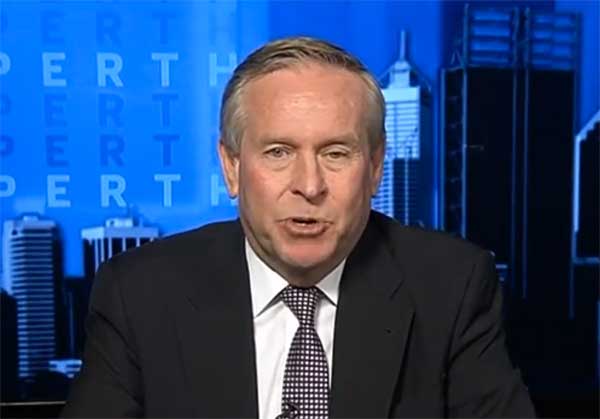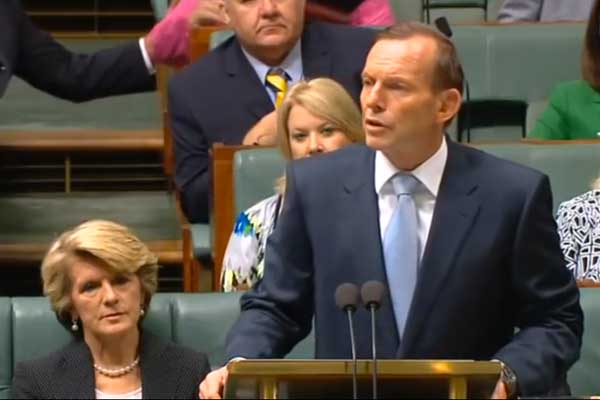If Tony Abbott’s claim that he is a friend of black Australia wasn’t already dead, it’s now well and truly not only cremated and buried, but the gravestone has gone up and the flowers are wilting.
The obituary of ‘the Prime Minister for Indigenous Affairs’ follows his comments yesterday that taxpayers shouldn’t be expected to fund the “lifestyle choices” of Aboriginal people living in remote regions.
In his signature ham-fisted way, Abbott was expressing support for West Australian Premier Colin Barnett’s decision to close down up to 150 remote Aboriginal communities, the victims of shameful government buck-passing after the federal government decided it wasn’t going to provide essential infrastructure and municipal services to remote Australia.
Under the deal, the WA government would receive $90 million to take over the delivery of these services, as the Commonwealth offloaded its responsibilities for remote communities back to the states.
Last week I thought the most offensive thing that could come out of this whole debacle was Premier Barnett’s attempt to justify what is, in reality, cold-hearted economics, by stating a planned review would uncover child sexual abuse and domestic violence.
In an attempt to distract with a mirage of humanity, Barnett decided to blame the blackfella by claiming the devastating problems within communities had led to his government’s decision to shepherd people off the homelands that sustained them and their ancestors for tens of thousands of years.

Barnett made his claims of domestic violence and child sexual abuse without any evidence.
Although issues around family violence are undoubtedly a problem in all Australian communities, Barnett made no mention of attempts to consult with communities, to talk about the underlying factors that lead to these devastating issues – issues like systemic poverty and the severe lack of services courtesy of decades of government neglect.
Refusing to fund infrastructure and municipal services that are the right of any Australian, and instead moving Aboriginal people from their homes, will not solve poverty. It will not solve dysfunction. It will entrench it.
It also does precisely nothing to stem the inevitable influx of displaced people into regional and larger centres, where there is already a massive strain on housing, health, education and employment services.
Premier Barnett’s attempts to justify what is essentially a racist policy by blaming Aboriginal people for the circumstances of their poverty is not a new method in Australian political theatre.
Under the guise of a newly discovered concern for children at risk of sexual assault within Aboriginal communities, the Howard government was given a free pass to roll out its own racist policy – the Northern Territory intervention.
We all know the outcome of that misadventure – a massive spike in attempt suicide and self harm rates; a drop in school attendance; a huge jump in jailing rates; and widespread unemployment.
Abbott was a member of that Howard government, and, it seems, an avid student of its teachings. He is a direct descendent of the racism of the Howard government, despite media swallowing his claims that he is passionate about Aboriginal Australia.
What Abbott is actually passionate about is assimilation. He has no concept of the unique relationship to land and country of Aboriginal people, something which is not valued in an economy which entrenches privilege for non Aboriginal people.
How else could you explain Abbott’s comments yesterday, equating Aboriginal connection to culture and land and ceremony with a “lifestyle choice”? Abbott apparently doesn’t believe in a “lifestyle choice” unless it conforms to his own ancient thinking about how Aboriginal people should live their lives.
If they can’t get a job, they should move away. If they can’t get an education, they should move away. If they can’t get health services, they should move away.
Never mind the fact that these are basic citizenship rights, enjoyed by any other Australian citizen. And never mind that no other citizen of this country would be treated the same way.
“If people choose to live miles away from where there's a school, if people choose not to access the school of the air, if people choose to live where there's no jobs, obviously it's very, very difficult to close the gap," he told the ABC.
In Abbott’s world, Aboriginal people “choose” to live in remote Australia and do not have an understanding of the economic realities which they are supposed to embrace and abide by.
He shifts his government’s failures to ‘Close the Gap’ on the shoulders of Aboriginal people, who supposedly are making “choices” that undermine his government’s attempts to help them.
Abbott’s rhetoric is not based on history – it is based firmly in paternalism, in his prioritising economic development over the right of Aboriginal people to culture and ceremony.
He assumes Aboriginal people have the same choices as non-Indigenous peoples, despite successive governments working to restrict the ability of our people to make choices which may not suit the government’s own agenda.
Abbott says Aboriginal people shouldn’t expect the rest of Australia to foot the bill if they “choose” to live on country. What, then, is his view of big mining companies ripping billions of dollars in resources out of Aboriginal land in exchange for pennies? Why do Aboriginal communities living near big mining operations still exist in poverty, despite the wealth being ripped from their lands?
Why isn’t Abbott demanding those companies make better ‘choices’ to share their wealth?
Abbott and much of this nation remains blissfully unaware of how white prosperity has been built off the back of black poverty, off stolen wages and stolen lands.
His underlying message is that Aboriginal people do not have the right to exist as self-determining peoples. They may live in white Australia if they play by white Australia’s rules.
But many Aboriginal people are refusing to comply. Noongar activists in Perth are already preparing for this rights assault. They have set up their own refugee camp to house people who are being forced off their homelands.
Is this the 21st century? Is this actually Australia, the lucky country, where Aboriginal people, the traditional owners of this land, are setting up refugee camps because government can’t see solutions beyond cutting funding and forcing behavioural change on people who’ve always been dispossessed and ignored for generations?
It’s worth noting that the policy of moving Aboriginal people off country is also not particularly new. As early as 2009, the NT Labor government embarked on its controversial Growth Towns policy, which selected 20 ‘growth hubs’ in which to concentrate a small pool of funds, effectively starving Aboriginal people off their homeland communities and outstations.

The result was increased rates of homelessness and strains on infrastructure in bigger centres like Darwin and Alice Springs, and a rise in the number of Aboriginal people fronting court.
As Amnesty International campaigner Tammy Solenec told New Matilda yesterday, there is a wealth of research that shows Aboriginal people living on homelands are healthier and happier.
Government policies have been – and continue to be – catastrophic for remote black Australia. There is mixed evidence about Abbott’s school attendance measures, the cornerstone of his Indigenous affairs policy.
Many education experts remain concerned with the Abbott government’s focus on truancy, and penalising parents for failing to get their children to school at the expense of equipping classrooms with adequate resources and quality teachers.
On employment, rather than talk about building up a remote economy, creating jobs based on work that can be done in the community – like Rangers programs, or caring for country or participating in the green economy – the Abbott government’s direction has been to force Aboriginal people into a scheme that means they will work-for-the-dole or risk having their Newstart payments slashed.
Under the Remote Jobs and Communities Program, Aboriginal people are forced to work for five hours a day, five days a week for 52 weeks a year. Without any opportunity to graduate to a future job, because these jobs don’t exist, the Indigenous affairs minister Nigel Scullion has admitted he expects there will Aboriginal people stuck working for the dole for the next 30 years.
It’s lazy policy making, because organisations like the Aboriginal Peak Organisations of the NT have proposed models based on Aboriginal solutions – like the successful Aboriginal-devised and community-controlled Community Development and Employment Program (CDEP).
The feeling of disempowerment is stretching beyond jobs and education to the breadth of Aboriginal Australia, thanks to Abbott’s Indigenous Advancement Strategy (IAS). The IAS collapsed 500 broad funding streams into five, and forced Aboriginal organisations to compete against bigger, non-Indigenous organisations for funding.
Black bodies had to show how their work was meeting the agendas set by government, rather than Aboriginal people themselves. They had to play by the Abbott government’s rules. Many lost out and were unsuccessful in their funding bids, and the horror stories are slowly emerging across black Australia of competent, valuable community organisations being de-funded, in favour of large NGOs with no real understanding of community needs.
Abbott infamously called for a “new paternalism” nearly a decade ago, revealing then that his thinking was mired in the past.
It seems he has not learnt much. He is still living on the colonial frontier where it is not controversial to herd Aboriginal people off their lands, for their own good.
Tony Abbott is not the ‘Prime Minister for Aboriginal Affairs’. He is the Prime Minister for Paternalism.
If you think he’s hurting Australia, that’s got nothing on the damage he’s doing to a marginalised, dispossessed people.
Donate To New Matilda
New Matilda is a small, independent media outlet. We survive through reader contributions, and never losing a lawsuit. If you got something from this article, giving something back helps us to continue speaking truth to power. Every little bit counts.



